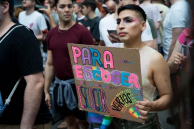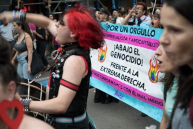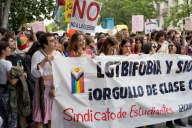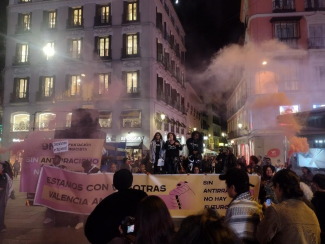Galia Cozzi Berrondo
PhD candidate, Department of Women's, Gender, and Sexuality Studies
Guiliano Fellow, Spring 2024
Latin/x American queer and trans migrant resistance:
The enduring powers of performance
In June 2024, I embarked on an ethnographic fieldwork project in Madrid, Spain, with the generous support of the Giuliano Global Fellowship. My research focuses on the performative interventions of queer and trans Latinx American migrants, exploring how these interventions are used to resist racism, heterosexism, transphobia, and xenophobia, and how they are spatialized across transnational spaces to build political coalitions with other social justice organizations. The decision to conduct fieldwork in Madrid was influenced by my interest in Colectivo Migrantes Transgresorxs, an LGBT/Q migrant organization in the city that uses performance and artivism to fight for trans and queer migrant justice.
Upon arriving in Madrid, I immediately began engaging with Colectivo Migrantes Transgresorxs to inquire about upcoming performative interventions. I discovered that the collective would be participating in the Critical Pride March on June 28. A couple of weeks after my arrival, I found myself at the Bilbao roundabout, where the march would begin. Armed with a camera and notepad, I documented how queer and trans migrant activists embodied their politics as they marched through the streets of Madrid. I observed the way coalitional politics were performed as Latinx queer and trans migrants, members of Migrantes Transgresorxs, marched alongside LGBT/Q student unions, anticapitalist groups, and antiimperialist collectives.



The summer months in Madrid, particularly July and August, are characterized by high temperatures and a quieting of political and cultural events, as many people leave the city escaping the heat for vacation. This break in the local activism happenings provided me with an opportunity to return to New York City and deepen my understanding of migrant and queer movements in Spain. During this time, I learned about and gathered information about other activist groups and organizations in Madrid focused on Latin American queer and trans migrant resistance, including Colectiva Warawas, an Andean marika collective of caporal dancers, and Colectiva Yawar Mayu, a migrant and diasporic collective of queer artivists.
When I returned to Madrid in September, I was pleased to find that Colectiva Warawas and Colectiva Yawar Mayu were organizing and participating in an open assembly to prepare for the Let’s Decolonize March in October. I attended the assembly to introduce myself to these groups and establish connections, as they were closely aligned with Colectivo Migrantes Transgresorxs. This assembly marked the beginning of my deeper involvement in Madrid’s anticolonial migrant solidarity efforts as a participant observer. I became part of the assembly, which has allowed me to engage in migrant justice activism both directly related to my research and in broader solidarity with the local community.

On October 12, I participated in the Let’s Decolonize March, a direct response to the Hispanic Day festival organized by the Madrid government. The march challenged the celebratory government narrative of multiculturalism obscuring Spain's colonial history in the Americas. At the end of the march, Colectiva Warawas performed a dance in the Museo Reina Sofia plaza, while Colectiva Yawar Mayu played a live song, collaborating with Gad Yola, a trans activist from Colectivo Migrantes Transgresorxs.
Throughout my fieldwork, I also participated in several talks, panel discussions, and community conversations to deepen my understanding of the queer and trans migrant movement in Spain.

My fieldwork in Madrid has provided me with invaluable insights into the intersection of queer and trans migrant resistance movements, and how performative and artistic interventions are used to challenge systemic oppressions such as racism, xenophobia, and homophobia. The solidarity and collaboration between migrant communities, queer and trans collectives, and other activist groups has been both inspiring and enlightening, offering a profound example of intersectional and transnational activism. The connections I have made and the experiences I have gained during this time have further deepened my understanding of and commitment to migrant justice and queer liberation which is fundamental for my dissertation research. I am deeply grateful to the Giuliano Global Fellowship for enabling me to undertake this research.
The Guiliano Global Fellowship Program offers students the opportunity to carry out
research, creative expression and cultural activities for personal development through
traveling outside of their comfort zone.
GRADUATE STUDENT APPLICATION INFORMATION
UNDERGRADUATE STUDENT APPLICATION INFORMATION
Application Deadlines:
Fall deadline: October 1 (Projects will take place during the Winter Session or spring semester)
Spring deadline: March 1 (Projects will take place during the Summer Session or fall semester)
Please submit any questions here.
